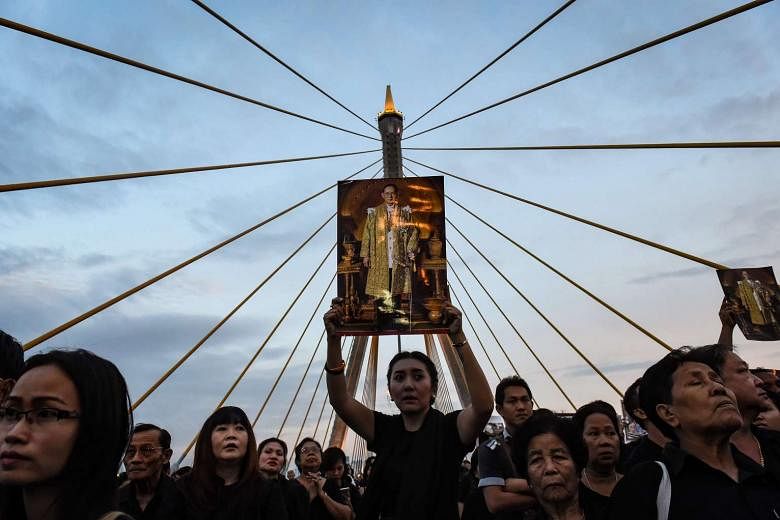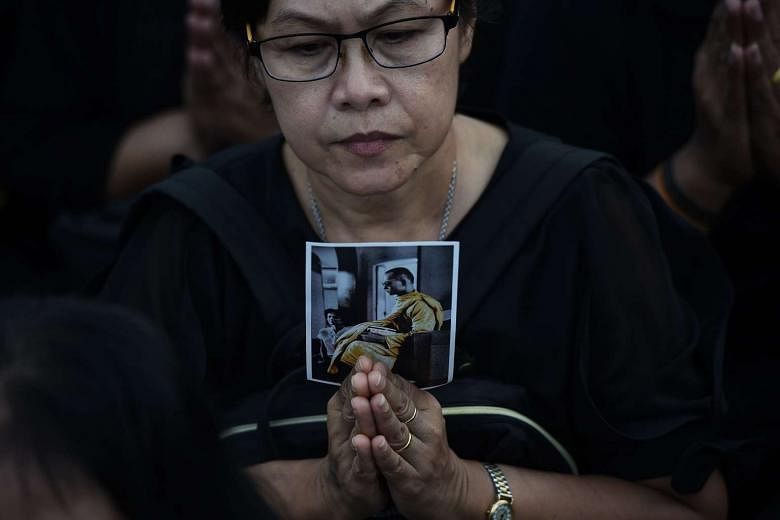BANGKOK (AFP) - Thousands of Thais gathered on a Bangkok bridge named after the late King Bhumibol Adulyadej on what would have been his birthday on Monday (Dec 5) , the latest organised mass display of grief in a divided nation adjusting to life without him.
For much of his remarkable seven-decade reign, King Bhumibol's Dec 5 birthday was an auspicious moment for Thais, with the monarch often delivering key speeches offering social - and sometimes distinctly political - guidance in a nation buffeted by years of coups and instability.
Stricken with ill health in the last decade of his life, he missed his last two birthday appearances before his death aged 88 on Oct 13.
His passing has plunged Thailand into a year of mourning, heavily orchestrated by an arch-royalist junta who seized power two years ago, and has removed a key pillar of stability.
"I still feel lonely and empty as we don't have him anymore," a visibly moved Yaowana Kaewpud, one of the mourners on the bridge, told AFP.
The 47-year-old and her daughters had travelled from the outskirts of Bangkok to attend Monday's dawn ceremony, which featured black-clad mourners giving alms to 999 monks.
King Bhumibol was widely revered as a calming constant and afforded a near god-like status among many Thais through his many years criss-crossing the nation, a reputation further burnished via a slick palace propaganda machine.
He was also shielded from any criticism or scrutiny inside the kingdom by a strict lese majeste law forcing subjects and the media to heavily self-censor.
His passing is a delicate transition both for the monarchy and its backers in the military elite.
King Bhumibol forged a strong alliance with Thailand's coup-prone generals, who often used perceived threats against the monarchy to seize power in putsches that were almost always recognised by the king.
His reign saw breakneck development but also entrenched disparity between a Bangkok-centric elite and the rural poor.
In the last ten years Thailand has been torn apart by competing political factions representing those two sides.
While King Bhumibol was widely revered, King Maha Vajiralongkorn has not yet achieved the same level of popularity.
The 64-year-old prince ascended the throne last Thursday after a seven-week hiatus in which he asked to be allowed time to mourn his father.
He is comparatively unknown to ordinary Thais, choosing to spend much of his time outside the kingdom and has not given an interview for years.
While critical reporting on the new monarch is curbed, most Thais are aware of his colourful lifestyle, his three marriages and some of the uncensored overseas articles that have been published about him, largely thanks to social media.
But forwarding such articles can be perilous.
On Sunday, prominent dissident Jatupat Boonpattararaksa was arrested for lese majeste for posting a profile by the BBC's Thai language service on the new monarch on Facebook.
He faces up to fifteen years in jail if convicted.





